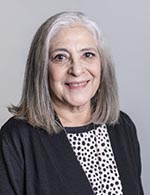Regina Diez is a social educator and national fundraiser at Foundation Josep Carreras, headquarters for the National Bone Marrow Donor Registry in Barcelona, Spain (REDMO, http://www.carrerasresearch.org/en). The foundation also supports a research institute to cure/stop leukemia and assist patients with some of their lodging needs at the transplant stage. We usually think of health care as clinical work, but sometimes, thanks to other actions developed by nonclinical staff, we can advance a clinical mission.
MM: Tell me about the health care system in Spain.
Regina: The health care system is free and universal. It provides medical appointments, emergencies, specialized care and medicines. However, dental and vision care are not covered; for that, you need to buy a private insurance or a complementary health policy.
MM: What are your areas of expertise in health care?
Regina: I have a passion for social causes, and have developed some expertise in management of volunteers in hospital settings and fundraising for nonprofits.
MM: What kind of volunteer work have you done?
Regina: The Hospital Sant Joan de Déu in Barcelona sees the patient, whether child or adult, as a whole and with the right to continue with their cultural, social and educational life while coping with their illness. Hospitalized patients experience a huge disruption of their lives, including separation from their family, school, friends and work, which presents a deficiency in their emotional, social and physical states. They need special actions to readjust their life balance.
A team of various professionals helps patients with this readjustment. The team focuses on all areas of life to prevent chronic disease from deteriorating patients’ social-physical functioning and emotional well-being.
MM: So how do volunteers contribute to the patients’ well-being?
Regina: For pediatric patients, volunteers promote recreational activities that allow the children to express feelings, communicate with staff and enjoy life within a context of illness and absence from their usual environment.
Family support is personalized to suit their socioeconomic situation and temporary residency far from the hospital. As needed, volunteers provide support that includes leisure activities and companions. These volunteer activities make the hospital stay less traumatic for the patients and theirs families.
MM: What are some of the challenges for the volunteers?
Regina: The main challenges are burnout and compassion fatigue. We emphasize to all team members the importance of supporting each other. We must not forget that this well-being needs to go hand-in-hand not only with medical practice but also with social practice, focusing on the planning and quality of the patient's experience.
MM: How important is fundraising to the foundation?
Regina: Fundraising is the foremost important activity for Foundation Carreras. We are a private institution, which means all programs we have require fundraising. We rely on donations from individuals and companies to maintain the Research Institute. This is an innovative, unique institute in Spain/Europe dedicated to studying malignant blood diseases. This project is our greatest effort. In conjunction with the public sector, we strive to make blood disease scientific research advance more rapidly.
MM: What is your specific role in fundraising?
Regina: I manage all “solidarity initiatives” that individuals make for the benefit of the foundation. Solidarity initiatives are a fundraising model in which requests for donations are made by the volunteers who speak to their friends, relatives, co-workers about raising funds to fight leukemia. One of our main collaboration targets is people who have lived with the disease.
My job is to create a bridge between our social database/potential donors and the financial goal. I help volunteers shape their idea according to their objectives and accompany them to talk to potential donors. We know that these “collectives” can raise substantial funds (Figure 1), whereas individuals tend to donate more modest amounts—although all donations are welcome.

Figure 1. Historical Chart of Total Solidarity Initiatives
MM: How do you set goals and your most important campaigns?
Regina: We have annual objectives, based on research project needs. We have specific campaigns for more ambitious objectives. We constantly try to achieve a greater impact in society and reach new audiences, while keeping the current ones. Last year we raised €509,000 (approximately $577,450 U.S.). Our annual awareness campaign occurs in June when we celebrate the European Week Against Leukemia. We use this campaign to give voice and visibility to the disease and manifest the importance of scientific research while thanking our patients, friends and families for all the support they provide throughout the year. The day of the UNSTOPPABLEs (the biggest campaign all over Spain) is the most magical (https://www.youtube.com/watch?v=z8ftUMXZlFs).

